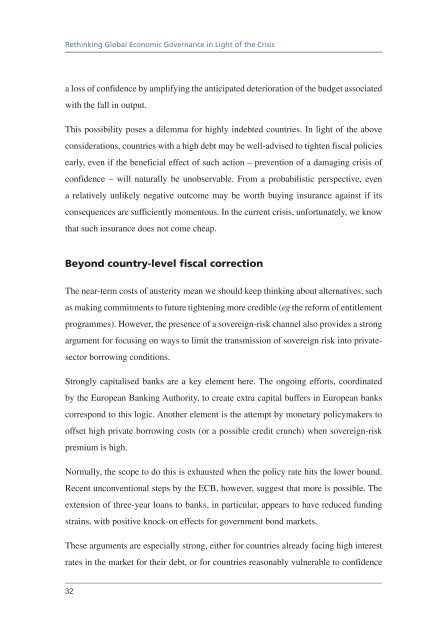Download PDF - Vox
Download PDF - Vox
Download PDF - Vox
- No tags were found...
You also want an ePaper? Increase the reach of your titles
YUMPU automatically turns print PDFs into web optimized ePapers that Google loves.
Rethinking Global Economic Governance in Light of the Crisisa loss of confidence by amplifying the anticipated deterioration of the budget associatedwith the fall in output.This possibility poses a dilemma for highly indebted countries. In light of the aboveconsiderations, countries with a high debt may be well-advised to tighten fiscal policiesearly, even if the beneficial effect of such action – prevention of a damaging crisis ofconfidence – will naturally be unobservable. From a probabilistic perspective, evena relatively unlikely negative outcome may be worth buying insurance against if itsconsequences are sufficiently momentous. In the current crisis, unfortunately, we knowthat such insurance does not come cheap.Beyond country-level fiscal correctionThe near-term costs of austerity mean we should keep thinking about alternatives, suchas making commitments to future tightening more credible (eg the reform of entitlementprogrammes). However, the presence of a sovereign-risk channel also provides a strongargument for focusing on ways to limit the transmission of sovereign risk into privatesectorborrowing conditions.Strongly capitalised banks are a key element here. The ongoing efforts, coordinatedby the European Banking Authority, to create extra capital buffers in European bankscorrespond to this logic. Another element is the attempt by monetary policymakers tooffset high private borrowing costs (or a possible credit crunch) when sovereign-riskpremium is high.Normally, the scope to do this is exhausted when the policy rate hits the lower bound.Recent unconventional steps by the ECB, however, suggest that more is possible. Theextension of three-year loans to banks, in particular, appears to have reduced fundingstrains, with positive knock-on effects for government bond markets.These arguments are especially strong, either for countries already facing high interestrates in the market for their debt, or for countries reasonably vulnerable to confidence32














